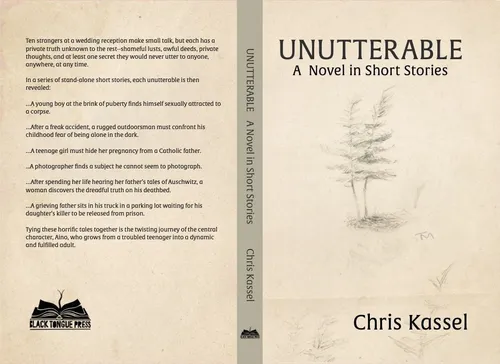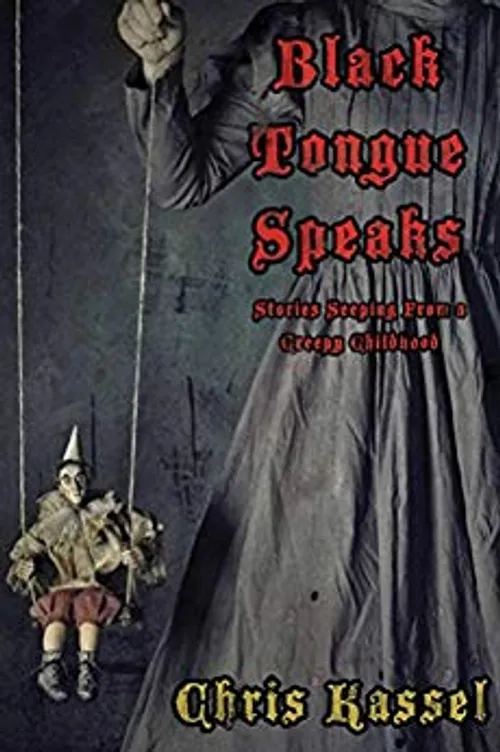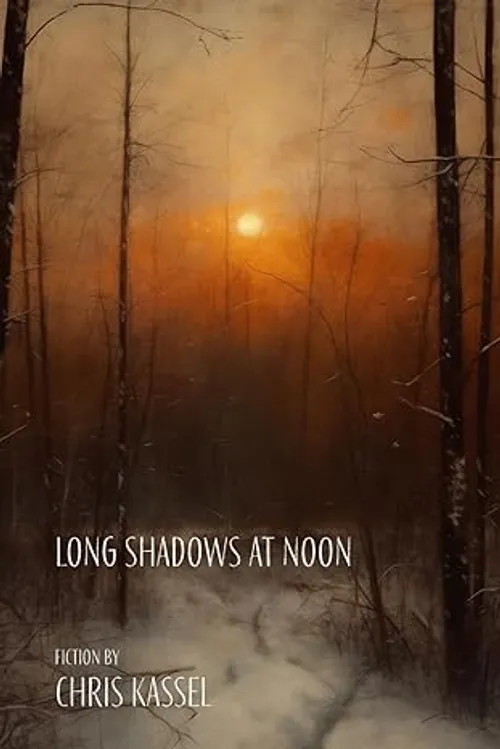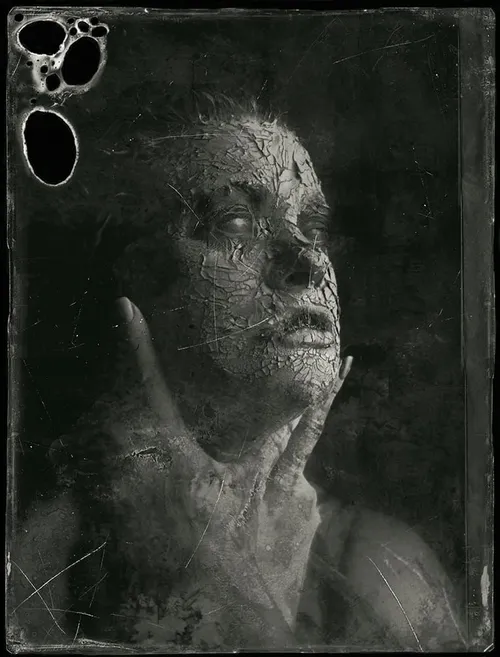Four days before Christmas, the sun didn’t rise at all. In the world beyond man-made things, the darkness seeped into birch dapples, dumbstruck creek beds and caverns yawning from the bedrock. On that day, the darkness would not be dislodged—morning never came. The early-winter, twilight-tinted fairy frosts did not appear, dewdrops didn’t glisten on the beard moss and the snowy whipped-cream pillars in the farthest reaches of the land remained in shadow. Grandeur capitulated and the night was complete.
Mikael Niemi did not live in this world, but he lived—as they say—too close for comfort. His earliest memories were of man-made things in a timber-framed, sod-roofed turve a mile from a settlement that clung to the hem of a vast unyielding Lappi fell. He remembered clutching the mittened hand of his big sister Ana on the three kilometer walk into Vaalkylä and to the village schoolhouse, both of them enveloped in coldness so unrelenting that it was nearly comical. Cold in league with dark infiltrated everything the children passed, the pyramids of kindling, the ricks, the gawky implements, the axes and grapples, the kick sledges, the calipers and the primitive chain saws.
But he also remembered that in the man-made world, four days before Christmas and for many days afterward the holiday illuminated the settlement, and every low-ceilinged farmhouse, wooden hut and craft workshop lit its windows with St. Lucia candles and paper lanterns. Those wired for electricity hung wreathes of bulbs around their doors, and at the courthouse, where miscreants scratched their names on the wooden walls while awaiting flogging, a tall spruce was strung with twinkle-lights as high as the ladder could reach.
Even after Christmas was over, the people of Vaalkylä greeted one another with ‘Hyvää Joulua’ for two weeks and the candles and icicle bulbs shone at the very least until the New Year. The season’s cheer and warmth might last still longer, largely based on individual economies, and as Mikael trudged the railroad tracks toward school, he took note of each dwelling as, one by one, the candles were snuffed and the Christmas lights winked out. First the Lampinens, next the Jutilas, then the Galléns or the Hikipääs, but there were usually a few hold-out dwellings that kept the festivities alive well into January. Risudden Stables, where they raised Icelandic horses, was often the most stubborn, and from the railroad tracks, the dazzle from the red villa shone through the darkness. Every morning from late December to mid-January, as he clumped along with Ana, scoured by gusts of wind beneath a sky solid with clouds, unbroken by a glittering moon scythe or the dull brilliance of an aurora, he dreaded the day when even the Risuddens would admit defeat.
Mikael never mentioned this anxiety to Ana, but he sensed that she had similar premonitions; she squeezed his hand tighter as the night extinguished each tiny pocket of resistance.
Vaalkylä Alakoulu was a primary school and students were finished by the age of twelve. When Ana Niemi reached that milestone, she went to work with her mother as a laundress. That winter, four days before Christmas and for many days (and many years) afterward, Mikael walked to school alone.
On those solitary treks, busting though crusts of snow, creeping down lonely lanes passed the timberhouses and cottages, slogging the final stretch along the train tracks without a mittened hand to embrace, his terror grew as he waited for the last of the Christmas lights to go out. When even the Risuddens villa went dark and the final gloom settled in—when he could hear numinous winds battering the pines and wolves howling across the arid eskers—every horror fable from every storybook was real; ogres lurked in the valley bogs, monsters thrashed beneath the frozen järvet, infernal, eternal night was made flesh, the earth was a conspiracy and he was doomed. At the age of nine, without Ana, swallowed whole by polar night, he first understood a crucial truth and made an intrinsic and (he thought) shameful self-discovery. Although he would never breathe it to a soul, it would trouble him for the rest of his life:
He was morbidly afraid of the dark.
Erno Niemi was a squat, gruff, fellow with bristling eyebrows and nail-studded boots that clumped wherever he walked, even in the dirt. A pale, pinched child, Mikael saw his father as a massif—an invisible wall able to keep out the cold and fill the table, but otherwise non-communicative. Erno provided for the family by trapping grayling in the River Taiva, raising patches of barley from which he distilled pontikka, then sold it from a kota behind the house. His mother supplemented her washing work by creeping and crawling through the vegetation, collecting bladder campions and the basal leaves of saxifrages. Neither parent expressed a want or hope that Mikael would carry this lifestyle into the next generation, but it was certainly the expectation.
But he had more ambition than that, and he applied himself at Vaalkylä Alakoulu. When he turned twelve, he began to take the Ski-Doo to the lyceum at Petäjoki. At sixteen, he bid his family goodbye and left Vaalkylä forever, finding dock work in the capital at Kallela Rahti while enrolling in Helsinki School of Business.
Kirkus Kallela, the shipyard’s owner, was a sharp man who was neither squat nor gruff, but tall and urbane. He did not wear nail-studded boots—he wore Italian loafers. He recognized Mikael’s ambition and decided to oversee his career, as a father might have done. In time, Mikael graduated with a degree in finance, married a girl from a café near the docks, and worked his way up the corporate ladder to become, at thirty, the freight yard’s commercial manager.
Each year, on the Friday before the week-long Christmas hiatus, Kirkus Kallela held a fourth-quarter fiscal meeting and holiday banquet for the executives of both the Helsinki and Port Pentwater operations. Mikael had now attended six of them, all held at the Grand Traverse Event Center. The shipyards were doing well, and the meeting emphasized fellowship, self-congratulation and techniques to achieve next year’s vision; the usual rainbows and confetti.
After it was over, Mikael had developed a private routine: Spending a couple days by himself before returning home to his wife and children for Christmas week. Not that this tradition should be misconstrued—he loved his family to distraction. He loved his job and he loved his comfortable urban existence in upscale Helsinki.
But he’d been raised amid pristine and largely empty wilderness and more frequently than he’d admit, he missed the nothingness of the winter wasteland, a stark and barren stage set as if for a Beckett play. Three hours north, in the Canadian border city of Sault Ste. Marie, there was a popular tourist excursion run by the Algoma Central Railroad. It was called the Wonderland Train and it left the downtown station at seven in the morning, picked up the Miskwaadesi River at Anjigami and headed north into Ontario lake country, reaching its apogee at Thunder Falls. At this point—around eleven in the morning—passengers could disembark and spend the day hiking, cross-country skiing or finding endless wintery photo ops in scenic Thunder Falls canyon. When the weather was rough, older passengers generally stayed in the dining cars, and four hours later, the train fired up for the return trip, and they would be back in Sault St. Marie in time for a late dinner. An adventurous few occasionally camped in the canyon and were retrieved by the train the following day. For obvious reasons, an overnight stay did not appeal to Mikael, but, four exhilarating hours of heavy skiing in the desolate landscapes of Algoma? That made for an afternoon he looked forward to all year.
That year, four days before Christmas, Mikael loaded his Altai Hok Skis into the special storage rack of the Wonderland Train coach. It was cold—not as cold as winters back home, although the forecast showed a dipping thermometer and a bank of snow clouds just to the northeast. As always, came prepared for emergencies: His pack vest contained essential survival gear—emergency flares, matches, a hydration bladder, Tensor wraps and a new Christmas gift from his boss: A precision-engineered compass in a mirror-polished fob case. Not only that, but his power-lifting at the gym, four times per week, ensured that he was physically fit. He knew the trails around the canyon and intended to ski about ten kilometers out and return the same way, following his own tracks.
The train trip was spectacular and those who had signed on primarily for the scenery were suitably wowed with the glittering purity of the snowscapes unfolding beneath an unhindered sun. GPS-triggered commentary filled the observation car with tales of the region’s rich Ojibway history, and like many Europeans, Mikael was somewhat obsessed with the native people of North America. He listened with rapt attention while outside the coach, the luminous vistas grew wilder. The train rumbled north, hugging the cliffs above the river; the clouds deferred until Mile 190, when they reached the lip of Thunder Canyon.
The dynamics of the descent were such that thick snowflakes which had begun to fall were suddenly pushed upward, reminding him of the fluffy cottonsedge down that rose from the bogs around Vaalkylä to signal his mother that the cloudberries were ripe. It was an incandescent memory, although when the train stopped on the canyon floor, the conductor announced that the outside temperature was minus seventeen Celsius and warned passenger to dress accordingly and, perhaps, to consider cutting hikes short. Mikael joked that for a Lapp, minus seventeen was beach weather, and when a trio of jolly, boisterous, red-faced campers climbed on board, glowing with health and perhaps a touch of aquavit, he spoke with them briefly, asking about snowpacks and trail conditions, determined to match their enthusiasm and make the most of the worsening weather.
In his element, Mikael knew some ecstasy—the peppery tingle of individual nose hairs as he sucked in air so cold that breathing it burned; the crunch of snow crust as he hopped from the car; the diminishing gradations of light that felt harder and clearer than full sun. He quickly strapped on his climbing skins, stepped into touring bindings, tugged down his goggles and headed into the couloir that wormed into the granite cliffs. He had the wind at his back—a boon since the 25-degree climb up the chute was the toughest part of the trek and the downhill return was the equivalent of a resort green-circle run. He was strong as a muskox and his technique was streamlined; heel lift, leg dragged forward maintaining the skin-covered ski base on the snow surface. His breath came in short pants; his wife had taught him yoga pranayama and he’d modified it for the sport: He inhaled on forward thrusts and exhaled as he pulled his leg back. On the steepest grades he doubled up on the pattern and the sound that escaped from his lungs reminded him of hand-sawing logs in the Eloranta mill and of the faint smell of burnt wood that permeated the building.
Drifting snow had mostly obliterated the trail, but to an experienced skier, it was traceable. It followed the thick belt of fractured rock above the Miskwaadesi, one of the longest undeveloped rivers in Ontario. The prospect, as always, was breathtaking. Volcanic ledges divided the river into numerous small cascades tinted gold by tannins leached from cedar bogs upstream. The largest of the falls were not frozen, but poured from a drapery of icicles that locked in the water’s spectacular motion.
Plowing a path through ungroomed snow was a full cardio workout. He knew the dangers of overheating and paced himself. Six kilometers up the trail, pushing mightily through shin-high drifts, he felt himself begin to perspire, and his reaction was immediate: He slowed his pace and partially unzipped his anorak, throwing back the hood.
This was his first critical mistake—an amateur’s blunder. The blizzard had been assaulting him from behind and a quantity of snow had built up on his shoulders, and now, the act of shaking back the hood made it tumble inside the anorak. It quickly melted and moisture began to wick through the wool of his sweater. His second mistake, he soon realized, was to ignore it until he crested the next ridge where he recalled that there was a stand of mammoth first-growth red pines. There, he assumed, would be enough shelter to change clothes. In his backpack, he carried spare layers—dry socks, dry gloves, a dry balaclava and another Merino wool sweater. He’d brought along this extra clothing in lieu of snowshoes, which—he considered later—might have been his third mistake.
As it happened, pine grove offered the expected shelter; great, grandfatherly limbs bowed beneath the weight of the snow and formed an igloo-like dome beneath the tree. By maneuvering through the boughs, he managed to worm into a small pocket where he could stand upright. But by then, full-body chills had set in and his fingers and toes had numbed. He had trouble with the quick-release sternum snap on his pack—ice, he suspected, had formed in the guts of mechanism. Gloved hands were useless, but his naked fingers were not much better. He fought back nerves, speaking gently to himself in measured tones and tried to control his hyperventilating by directing pranayama breath to the frozen buckle he cupped in his hands. It still wouldn’t open, and he began to sweat again. He became angry—the mechanism itself was jammed. He had an Enzo trapper’s knife attached to a molle strap on the pack, but he could not bend his arm at the correct angle to reach it; the wrong move would dislodge snow from the overhead branches. Shortly, panic rising rapidly, he reckoned that the endless hours he spent pumping iron had value outside the Töölö Gym, and he gave the strap a series of tremendous tugs until the plastic snapped.
Hypothermia leads to bad decisions. Survivalists know this, of course. He understood that it was pointless to complete the trail circuit—he was only a few kilometers from the idling train, perhaps seven, but likely closer to six, and with the blizzard having increased, he saw that his best option now was to head back in dry clothes, sooner rather than later: A certain logic suggested that he wait for the storm to abate, but by the time that happened, it might be dark. If the train departed without him, he’d be stuck in the canyon until the next day. The notion was a plague; it filled him with such visceral and lacerating horror that he rationalized it away immediately: Even though he was in a relatively sheltered location, he told himself that staying put was what tires did in a snowbank, spinning uselessly in self-made ruts. No telling when the blizzard might get better; now was the time to move, before it got worse.
Clear-headed thinking cheered him; he was a practical fellow. He was wearing North Face ski pants and two sets of thermals, so his lower half was fine. He hung the pack on a branch, stripped to the waist and put on a dry, button-up flannel, another sweater and a hoodie, leaving the deadweight clothing in a wet pile at the base of the pine. The pack which had betrayed him was useless without the sternum strap; it would not stay put on a vigorous hike, so, he removed some essentials—the flares, his knife and his compass—and left the deflated remnants beneath the tree with his wet clothes. He wormed a path beneath the ponderous boughs and back into the onslaught.
The route back was largely downhill, but he was no longer pushed along by billows of wind. Now, he was fighting against it; blasts of snow were thrown against his face in handfuls. On a clear day, the trial was well-defined by landmarks—outcroppings, chutes, Lake Jossakeed to the north, the old growth pine grove which he had just abandoned. In a whiteout, they vanished. Along the path, much of snow was channeled into drifts along the west side of the trail and the ski tracks he’d just laid were still visible, although shortly, they wouldn’t be. He kept his head low, wiping the snow from his goggles, pounding out breath through cracked lips, inhale on a forward thrust, exhale on the return. Resolution fixed his expression like something carved into a mountainside; he sought a Zen state of focused exertion, briefly losing track of where he was.
That was his fourth mistake: In autopilot, he mistook some random wind runnel for ski marks and veered from the trail. Over the edge of a frozen ridge he went, falling five meters to a granite ledge, landing on his knees, feeling a femur snap, then dropping another ten to do a face plant in the Miskwaadesi River.
Had he been able to fully inhale, he might have drowned, but the final fall had broken ribs and he sputtered and spat, believing, briefly, that he had been run through by a skewer. He saved his life by rolling and scrambling onto the snowy river bank. Shock made the initial pain manageable, but it quickly ramped up to surreal heights, and he vomited dizzily as the whiteness of his surroundings dissolved into tiny, colorful lights.
Coldness brought him around; his position, on his back, allowed him to take in more air, and his predicament shortly became obvious. As a practical man, he was able to break it down to individual constituents and his survival instincts were keen: He was wet, the temperature was dropping with the winter sun; his right leg was shattered and there was no chance of him climbing back to the trail on the ridge.
He ratcheted through the things he knew, the things he paid attention to, the things which he believed could now preserve him: At this latitude, the sun would set a bit after four p.m., around the time that the train would leave. He was confident that his absence would be noticed. Although he hadn’t spoken directly to many of the other passengers, he believed that a squat, muscle-bound fellow with prominent eyebrows would make a subconscious impression on them. Besides, he was the only solo traveler on board—that in itself was noteworthy. And then, he recalled with expansive relief, there were the campers: He had earnestly solicited their advice about trail conditions, and surely, they’d remember him and alert the conductor that he had not returned from his backwoods trek. In a worst case scenario, he assumed, the conductor would maintain the train’s schedule and leave, but not before contacting search-and-rescue in Timmins, a hundred eighty kilometers to the northeast. His own phone did not have a signal, but he presumed that the train was equipped with a sophisticated emitter-receiver. With luck, helicopters would be overhead within a few hours and his flares—still dry in a Ziploc bag in the kangaroo pocket of his sweatshirt—would be his means of signaling them.
He thought he could rationalize away the pain; tissue is soft, the world is dangerous, and pain is the mechanism that keeps us from chewing off our tongues. But he could not rationalize warmth. Freezing to death was the risk real he faced, or at best, nerve damage to his extremities before the rescue came. He choked up, remembering his five-year-old daughter Livvy as she watched him pack spare clothes, sagely instructing him not to let his toes get ‘bitten’, as if by a monstrous dog. His son Niko, nine, was eager for the following year when Mikael promised him that he could go on the same skiing expedition. Dear Matleena, his wife—who had used her own business degree to turn the small café she bought into a trendy Helsinki hot-sport—worried as soon as he set foot outside their home in Suutarila and was probably worrying at this instant.
Now, their worst fears had come to pass. Dry, and with slightly more mobility, he’d have carved out a snow cave and built a ledge to await rescue, but his body began to spasm and he saw that he would not survive three hours without a fire. Wood was nearby but maddeningly out of reach: A fortress of pines stood atop the ridge, twenty meters overhead but as inaccessible as if it had been in Siberia. And yet, squinting through the blizzard, he saw a singular opportunity—ahead, at a distance of a couple of tram cars, some past cataclysm had hurled a dead tree down river to snag against the rocks. Its snow-clad upper branches lay exposed on the bank and looked accessible. It was a ridiculous crawl for a man with his injuries, but he set off without hesitation, dragging himself through wind-hardened drifts, up tumbles of rock debris, around boulders. Every new piece of ground was hard won and the agony was otherworldly, but his family remained the forefront of his mind and his ancestors were close behind: Such fatalistic determination was the hallmark of a race that had chosen the wrong side in two world wars.
Time dissolved, but he made it to the tree before the sun set. By then he was caked in ice and nearly spent, and it was all he could do to raise an arm to begin snapping off twigs. For tinder, he had nothing but forty-seven American dollars in his wallet, tens and a couple of singles, easily sacrificed, and in the crook of the tree’s horizontal limbs, he made a sad little pile of wadded-up cash. Above it, he began to build a pyramid of kindling sticks. There was no room for error; if this heap did not ignite, he was doomed. His matches were damp, but he knew that one of roadside flares would work. Again, it was an easy decision. The flare ignited the blaze, and thus cheered, he summoned the grit to snap off some windfall’s larger limbs. With sweat running into the tannic crust of river ice on his clothing, he made a small stack of firewood which he believed, judiciously, might keep a small fire going for a few hours. He would have to maintain it at a size just large enough to provide sustenance warmth, but it would not be big enough to dry his clothing. It would therefore be touch-and-go until rescue came, and he kept the other two flares at the ready, listening for the sound of a helicopter or a snow mobile.
The blizzard finally abated; too little too late. High up, skeleton clouds flew northeast to southwest. For a while, they took on a rainbow fringe, then the blood drained from them and they fled without color. There was no moon and around him, darkness began to gather as a spider wrapping prey.
Restless winds in the high pines made a steady and monotonous drone. He recalled from physics class that the hiss of white noise between radio stations was actually leftover radiation from the Big Bang, but the throaty roar that came from the mammoth pines was anything but white; it was part of the omnipotent greyness of a winter nightscape. It persisted with such intensity that he was afraid he would not hear the rescue crews until they were overhead, so he clutched a flare in fingers that had gone suspiciously white, cap off, striking surface at the ready, and stared at the sky.
At intervals, other sounds cut through. Ethereal howls from coyotes, the lonely boo of an owl, a lynx squeal and occasional thuds that he guessed were built-up snow falling from trees. He remembered the bog ogres that terrified him as a boy; the Ojibway had wendigo, a spectral giant who crashed through these very woods. Early night terrors, suppressed during an adulthood where nobody ever needed to be alone in the dark, emerged instantly within his consciousness. He cocooned around the flames, feeding them when they cried for it, his body shaking with cold, focusing on the shower of sparks that shot upward whenever he threw on a fresh branch.
In that bitter night, four days before Christmas, the cold seemed to develop a conscious malevolence. In all of Thunder Canyon, only two bastions of warmth existed—one sputtering in the well of a dead tree and the other flowing through his veins. As long as the former held, the latter would also hold; without one, both would die. Beneath a clear December sky, the temperature plummeted. He guessed it at minus fifty C. Still wet, in excruciating pain, he fought the tug of drowsiness, which he knew to be death trying to drag him into the abyss. He forced himself to concentrate and to feed the small smoldering heap that stood between him and the great yawn of eternity.
Despite all this, he drifted away. When he awoke, he had no sensation below his waist, and very little above it beyond an ache so overwhelming that it engulfed the cosmos. Darkness had fully come, and only a few embers remained on his makeshift hearth. In desperation, he flipped open his Enzo knife and began to shave small pieces of wood from one of his remaining sticks, blowing on the ashes as vigorously as he could through a collapsed chest. It was futile, and in time, he realized that the only way to resurrect the fire was to light another flare, leaving him with only one.
The warmth brought him fully to his senses, and a dreadful thought occurred to him. His phone—which had no bars but still told time—confirmed it. It was long past time for a rescue crew—he’d expected them soon after dark, and it was now nearly midnight. They were not coming after all. And with equal suddenness, he guessed why: In questioning the campers about canyon conditions—the condition of the trails and the snow in the valleys—he’d never once mentioned that he was not intending to camp there himself. He was fit, carrying more equipment than he needed, and they were half drunk. Of course they must have assumed that he’d intended to stay overnight himself, and if asked, they would probably assure the conductor of it. In a worst case scenario, they may have joked, he’d have to build a bonfire and wait for the next day’s train.
And here he was, alone, with no rescue coming and no means of building that bonfire, no means of keeping warm until dawn. Reality rose in his gullet as an embolus and settled as a shimmering snowdrift. The dismal sigh was a resignation of a race who had lost two world wars.
The dying are not blind to irony; if anything, they are keen to it. He was afraid of the dark and he’d never told a living soul. Now that he was desperate to admit it, there was no one to tell, no one to hear the confession and no absolution possible beyond the short step he’d soon take into ultimate darkness. In absentia, he spoke the names of his wife and his children and his voice, swamped in grey noise, was as thin as semolina porridge.
Ogres stomped and native spirits writhed. There was no mittened hand to clench. In a while, along with the fire, he began to fade. Four days before Christmas, far from Vaalkylä, Mikael’s night would be endless. For him, the sun would not rise at all. In a while, he lit his last flare, buying himself fifteen minutes. He faced the spitting sparks, and like the Christmas lights at Risudden Stables, he waited wretchedly for them to go out.











This story has not been rated yet. Login to review this story.